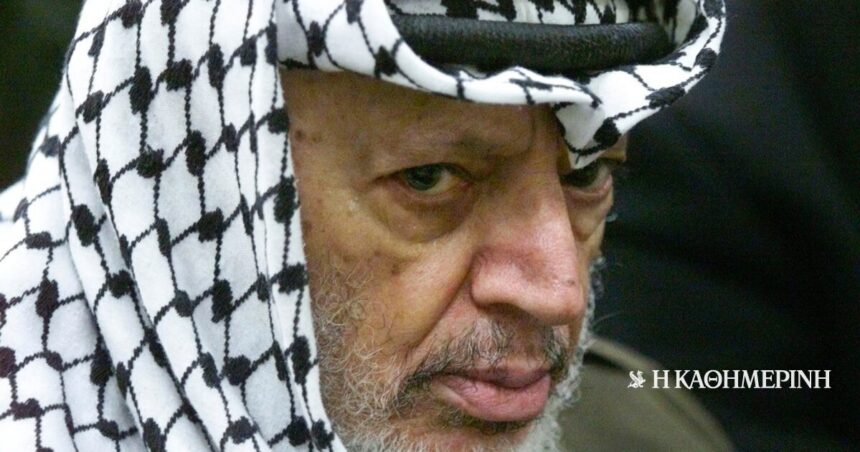“After inadvertently keeping the world in suspense, o Yasser Arafat or Abu Amar passed away yesterday morning at the Percy military hospital in Paris. The man who for four decades embodied the redeeming desires of the Palestinian nation, left the world aloof and shrouded in mystery, as befits a Rais, i.e. a leader”, wrote “Kathimerini” on its front page, on November 11, 2004, referring to death of the Palestinian leader.
Born in 1929 in Cairo, Mohammed Yasser Abdel Rahman Abdel Rauf Arafat al-Qudwa, popularly known as Yasser Arafat, grew up in Jerusalemin a family with Palestinian roots. From a young age he experienced first-hand the consequences of displacement, which were magnified by the wider political conflicts over Palestinian land. His life soon became intertwined with the Palestinian struggle, setting him on a course that would make him one of the most recognizable figures in world politics.
His life was soon linked to the Palestinian struggle.
In the 1950s, Arafat co-founded Fatah, a political and military organization dedicated to the establishment of an independent Palestinian state. Fatah operated largely in exile, organizing insurgent attacks against Israel, which, at the time, led to both domestic support from the Palestinians and condemnation from Israel and other nations. By 1969, Arafat had become its head Palestine Liberation Organization (OAP / PLO), an umbrella organization that sought to represent the Palestinian people. He went on to lead Fatah and the PLO for decades, being the “face” of the Palestinian movement and embodying the dream of Palestinian statehood.
His methods and rhetoric polarized international public opinion.
The image of Arafat – often in his iconic keffiyeh scarf, military uniform and unshaven face – was a symbol of resistance for Palestinians. To many, he was a freedom fighter, willing to do anything to bring international attention to the Palestinian cause. However, Arafat designated as a terrorist by Israel, the United States and others for his organization’s militant activities, including hijackings, bombings and cross-border attacks. For years, he remained diplomatically isolated, navigating a difficult terrain of alliances, warring factions and intense scrutiny.
Nevertheless, the 1990s brought a significant change. After the end of the Cold War and the changes in world affairs, Arafat participated in negotiations that led to the historic Oslo Accords in 1993. This landmark agreement, brokered by the Israeli Prime Minister Yitzhak Rabinaimed to set a path to peace by establishing Palestinian self-government in parts of the West Bank and Gaza Strip. The agreement was seen as a milestone and a step towards achieving a two-state solution, with Israel and Palestine coexisting peacefully. For his role in the peace process, Arafat was awarded the Nobel Peace Prize in 1994, along with Rabin and Israeli Foreign Minister Shimon Peres.
However, the Oslo accords ultimately failed to deliver a lasting peace. Tensions remained high and the outbreak of further violence, including the outbreak of the second Intifada in 2000, eroded hope for a two-state solution. Arafat’s inability to quell militant tendencies within Palestine, his refusal to make additional concessions, and political pressure from the Israeli leadership and international allies have led many to view him as an obstacle to peace. In 2002 he was confined to his compound in the West Bank city of Ramallah by Israeli forces, marking the beginning of a period of isolation that would continue until his death.
His death in a military hospital in Paris caused considerable speculation.
The death of Yasser Arafat on 11 November 2004 in a military hospital in Paris caused considerable speculation. After falling ill under undisclosed circumstances, he was airlifted from Ramallah to Paris, where he succumbed weeks later. Despite numerous investigations, the cause of his illness and death remain unclear. Some suspected poisoning, citing traces of polonium found in his belongings, although this was not definitively confirmed.
For Palestinians, Arafat remains a symbol of resistance and national identity, a leader who brought their plight to the world stage. For others, his role in the Israeli-Palestinian conflict is viewed with greater ambivalence, reflecting both his early militancy and his later – if inconsistent – turn to diplomacy.
Column Editor: Myrto Katsigera, Vassilis Minakakis, Antigoni-Despina Poimenidou, Athanasios Syroplakis




